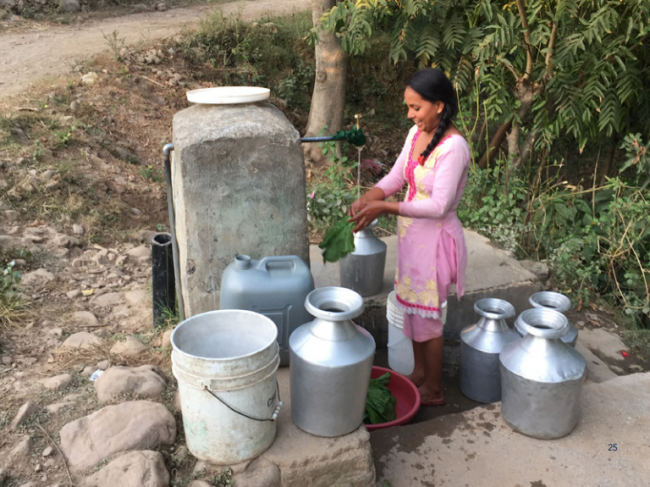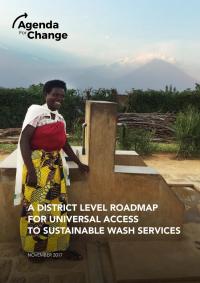A new global guidance document on the District-Wide Approach.
Published on: 25/01/2018

Achieving the ambitious targets of universal and sustained access to WASH services requires building the systems to deliver such services, particularly at district level. Navigating the complex process of building such systems is now made easier by a roadmap developed by Agenda for Change.
In Nepal, the recent shift to the federal form of governance has created new local government entities across the country. Whilst the new constitution devolves much more power to them, these embryonic local entities lack capacity, structured processes or systems to ensure public services. These local authorities are expected to develop local plans which will achieve the national Sustainable Development Goal (SDG) targets, but currently lack data, or even personnel on which to develop such plans!
However, the lack of capacity at the local authority level is not just an issue for Nepal. District structures across the developing world often lack personnel, expertise, processes and resources to ensure quality service delivery, and to ensure the WASH services in their district continue to function through time.
There is increasing agreement that reaching the WASH SDGs requires having the systems that are needed to deliver those services. That includes institutions such as service authorities and providers; monitoring systems; systems for regulation and oversight; but also asset management systems, among others. Such systems are incipient at best in many countries, and developing or strengthening those may be an overwhelming task. Agenda for Change – a global initiative of a number of WASH NGOs – proposes a roadmap to navigate the complex process of building and strengthening such systems.
The Agenda for Change partners are following similar approaches with slightly different names (District Wide Approach; Everyone, Forever). But in essence this consists of supporting the local governments to plan for and achieve universal and sustainable WASH services at district level, by strengthening systems at the local level which can sustain and also scale the impacts of individual projects within the district.
 From the experiences in a number of countries by different organisations in this approach, a generic roadmap document has been developed. This roadmap provides guidance to organisations and their country teams on how to take a systems strengthening approach in their programme areas. The roadmap proposes a step-wise process, which runs from an initial visioning exercise with local authorities, to a comprehensive baseline assessment phase (covering issues like financing, water resources, assets, service levels and institutional capacities), to developing the WASH plan, and on to supporting its implementation. The roadmap provides guidance on the process, considerations for each step, and provides links to tools which have been developed to undertake various activities.
From the experiences in a number of countries by different organisations in this approach, a generic roadmap document has been developed. This roadmap provides guidance to organisations and their country teams on how to take a systems strengthening approach in their programme areas. The roadmap proposes a step-wise process, which runs from an initial visioning exercise with local authorities, to a comprehensive baseline assessment phase (covering issues like financing, water resources, assets, service levels and institutional capacities), to developing the WASH plan, and on to supporting its implementation. The roadmap provides guidance on the process, considerations for each step, and provides links to tools which have been developed to undertake various activities.
As a generic roadmap not specific to any particular district or country, the roadmap is intended to be an overall reference tool, rather than being prescriptive or didactic, and needs to be adapted to the local context in which it is applied. It also recognises that the road to universal coverage is rarely ever linear: often, one hits the road halfway; then one has to turn around, take a few roundabouts, and come back to the starting point before proceeding. The roadmap document provides the required flexibility in doing that.
The document is already helping to provide guidance to a number of country initiatives, and will be periodically updated based on experiences from the field. Future iterations will also seek to further highlight sanitation and hygiene in systems strengthening, and will increase the applicability of the roadmap to urban contexts.
Back in Nepal, a new member of Agenda for Change (Welthungerhilfe) is about to start the journey of the District-Wide Approach in newly established Rural Municipalities in Chitwan. Local stakeholders are very excited! The hope is that through the process of systems building in these few Rural Municipalities, an approach to supporting these embryonic local governments can be demonstrated, which others in the sector can learn from and take to scale.
We encourage others to hit the road of building district WASH systems as well, and use this roadmap as navigator.
We welcome reflections from you – please contact will.tillett@aguaconsult.co.uk and/or smits@ircwash.org.
At IRC we have strong opinions and we value honest and frank discussion, so you won't be surprised to hear that not all the opinions on this site represent our official policy.